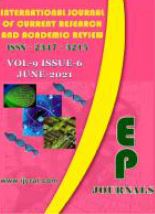Abstract Volume:9 Issue-6 Year-2021 Original Research Articles
 |
Online ISSN : 2347 - 3215 Issues : 12 per year Publisher : Excellent Publishers Email : editorijcret@gmail.com |
Propolis is a natural substance collected by honey bees from various plants such as, poplar, palm, pine, conifer secretions, gums, resins, mucilage and leaf buds. It is collected and brought very painstakingly by honey bees to be used for sealing cracks and crevices occurring in their hives. Originally, it as an antiseptic meant for preventing bee-hive from microbial infections along with preventing decomposition of intruders. Additionally, propolis has been used in folk medicine for centuries. The biological characteristics of propolis depend upon its chemical composition, plant sources, geographical zone and seasons. More than 300 compounds have been identified in propolis such as, phenolic compounds, aromatic acids, essential oils, waxes and amino acids. Many scientific articles are published every year in different international journals, and several groups of researchers have focused their attention on the chemical compounds and biological activity of propolis. In Ethiopia its production is not reported in any part of the country.
How to cite this article:
Temesgen Kassa Getahu. 2021. Production Status of Propolis in Ethiopia (Bee Glue) and its Medicinal Importance in Livestock.Int.J.Curr.Res.Aca.Rev. 9(6): 83-91doi: https://doi.org/10.20546/ijcrar.2021.906.009



Quick Navigation
- Print Article
- Full Text PDF
- How to Cite this Article
- on Google
- on Google Scholor
- Citation Alert By Google Scholar
